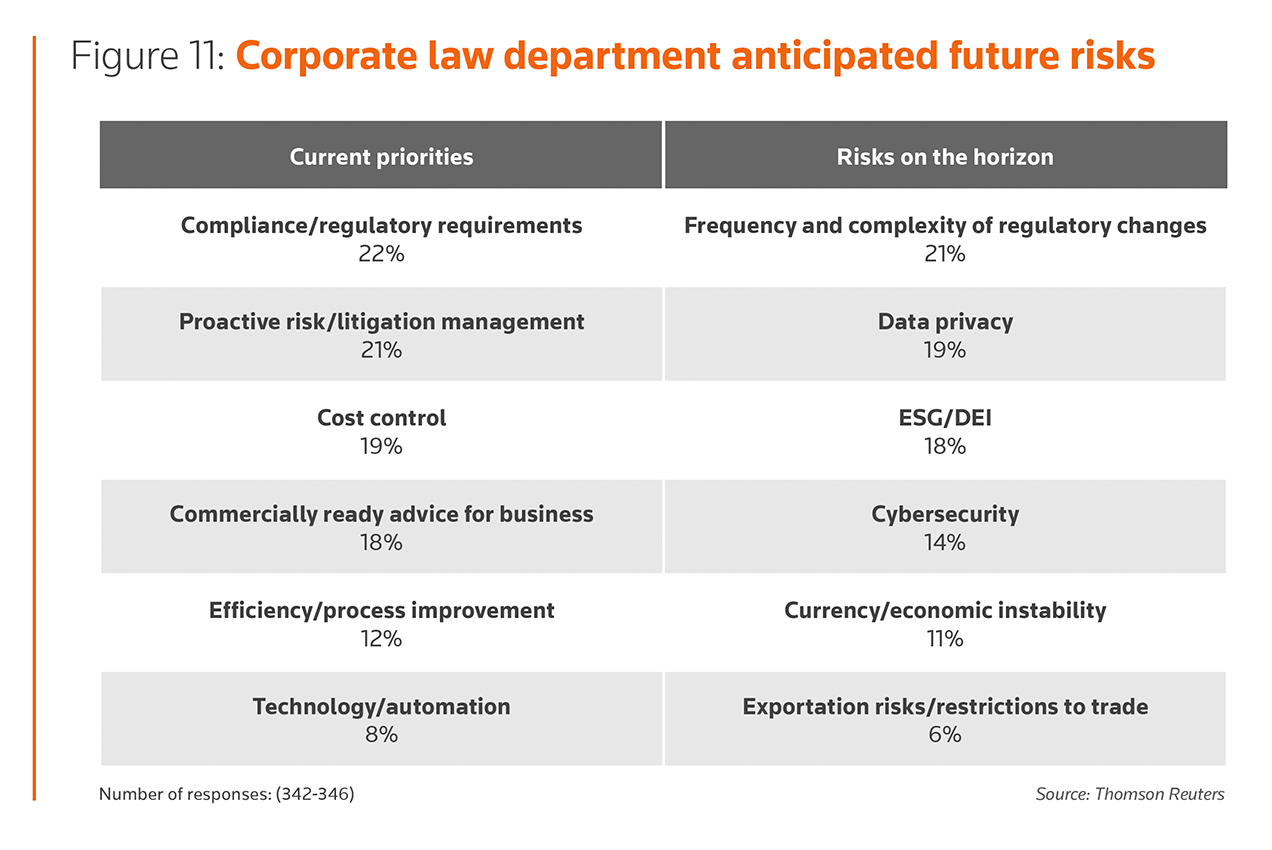Our recent “2023 State of the Corporate Law Department” report shows how a focus on ESG initiatives can benefit both corporate legal and law firm teams
Compliance & regulatory requirements was the most popular existing priority for general counsel (GC), according to the Thomson Reuters Institute’s recent 2023 State of the Corporate Law Department report, with the frequency and complexity of regulatory changes being the most-cited risk on the horizon say a majority of corporate chief legal officers (CLOs).
 Environmental, social & governance (ESG) issues represent one of the key areas of complexity in global regulatory landscape. Yet, when asked specifically about ESG, it was the third-most cited risk on the horizon, with one-in-five law departments seeing ESG as a major future risk.
Environmental, social & governance (ESG) issues represent one of the key areas of complexity in global regulatory landscape. Yet, when asked specifically about ESG, it was the third-most cited risk on the horizon, with one-in-five law departments seeing ESG as a major future risk.
Even more interesting is that data privacy and cybersecurity were also in the top 5 risks on the horizon, according to the survey. Clearly, GCs and CLOs would agree that these two risk concerns are important governance issues as part of the G in ESG. Indeed, looking at top 5 risks on the horizon cited in the survey, one could easily argue that ESG, when including data privacy and cyber-risk, is actually among the most important risks on the horizon.
If we agree that ESG encompasses data privacy and cybersecurity, then ESG rises to the top as one of the most popular risk on the horizon over the next three to five years by corporate legal departments across the world. And while the regional variations are also quite interesting, they send the same message: ESG, including data privacy and cyber-risks, is a key governance issue that is top of mind for many corporate law department leaders.

Taking action on these insights
More importantly, law firms can use this market intelligence to invest in their practices. For example, law firms with ESG practices should be ramping up in the regulatory & compliance areas because this has been cited as the most pressing current priority and one of critical importance in the future. In particular, in-house legal departments are challenged to keep abreast of regulatory changes — and because ESG is a major area of fluctuations in regulatory requirements — law firms would be wise to prioritize their analysis and forecasts of ESG regulations across jurisdictions and highlight new details of reporting requirements of existing regulations and show how clients can meet compliance obligations.
In addition, spotting issues in emerging ESG areas, such as biodiversity, is another consideration. For example, the Task force for Nature Related Financial Disclosures just released its Beta v0.4 with recommended disclosures, which clients may find confusing and complex.
Decarbonization of their supply chains is another major challenge for companies, particularly for those with complex value chains. There are many components of this issue with which clients may need assistance, such as implications for vendor contracts and outlining new requirements for data reporting in contracts, such as greenhouse gas emissions and certification in forced labor regulations. At the same time, companies need to increase their ability to conduct due diligence of prospective suppliers on human rights and other denied-party screening.
Antitrust issues also are a growing area of concern for companies, in large part because of U..S lawmakers’ recent allegations that industry collaboration on ESG violates antitrust laws, specifically, firms could focus on the “rule of reason” test through the lens of market impact or market power, as well as delineating business justifications in the U.S.
Finally, employee well-being continues to grow in interest among shareholders and investors, and ESG and diversity, equity & inclusion (DEI) was cited as a top-5 priority for in-house legal departments. This represents a tremendous opportunity for law firms’ labor & employment practices, especially as companies continue to struggle with varied preferences in work flexibility amid remote working frameworks. In addition, companies are consistently in need of updated and expanding HR policies across pay equity, learning & development, as well as DEI, among others.
The existing regulatory landscape is a tough challenge for many in-house lawyers. Moreover, the future remains murky is in this space, according to corporate law department leaders, and in-house lawyers will need the assistance of outside counsel to meet expectations. This leaves law firms with an abundance of business opportunities across ESG practices to seize upon.







